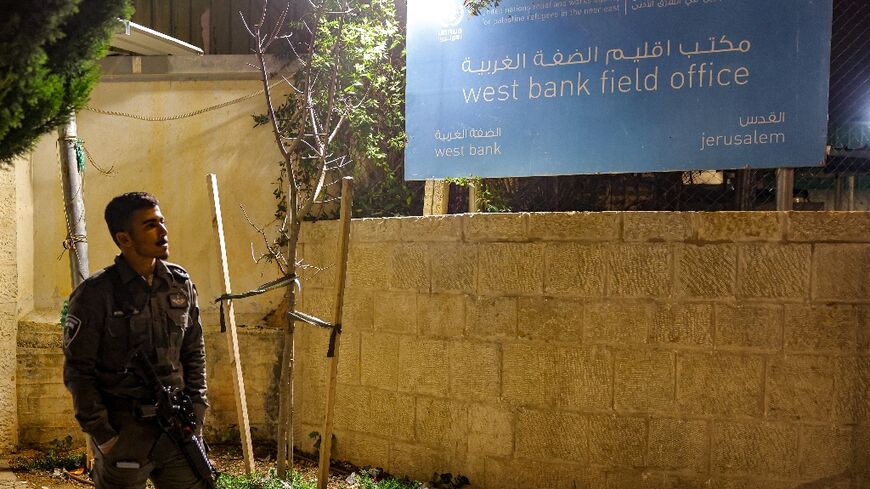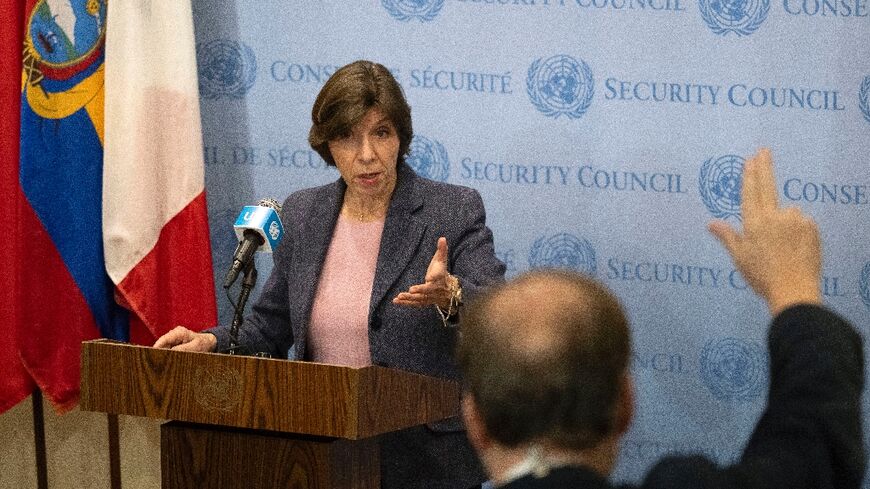UN's Colonna in Israel on first UNRWA-Hamas probe trip
Catherine Colonna, the former French foreign minister leading the United Nations probe into the alleged association between the UNRWA and Hamas, is meeting with Israeli officials, as many countries have suspended funding to the organization.

Former French Foreign Minister Catherine Colonna arrived in Israel on Monday to pursue a probe into the UN Relief Agency's alleged ties to Hamas.
Colonna was appointed last month by UN Secretary-General Antonio Guterres to head an independent review of the UNRWA after the Israeli government alleged that at least 12 of the organization's employees took part in the attack on southern Israel on Oct. 7.
Upon arrival, Colonna met with Director General of the Israeli Foreign Ministry Yaakov Blitstein and is set to meet with other Israeli diplomatic, security and intelligence officials. Colonna posted on Saturday that she was set to meet officials both in Jerusalem and Tel Aviv, though it's unclear exactly who she will meet with. The Foreign Ministry and the Prime Minister's Office are in Jerusalem while top Defense Ministry officials are based in Tel Aviv.
Meanwhile, Israel’s Foreign Minister Israel Katz was unable to meet with Colonna as he traveled on Monday to New York for a meeting convened by the United Nations Security Council focusing on sexual attacks committed by Hamas militants against Israeli women on Oct. 7.
Investigative panel's mandate
Guterres announced on Feb. 5 the appointment of Colonna, who left her position within the French government four weeks earlier, to head a review of the accusations leveled against the agency. A statement by the UN said a panel was charged with assessing “whether the agency is doing everything within its power to ensure neutrality and to respond to allegations of serious breaches when they are made.”
Colonna was mandated to work with three European research groups — the Raoul Wallenberg Institute in Sweden, the Chr Michelsen Institute in Norway and the Danish Institute for Human Rights — to investigate the Israeli claims and is expected to submit a preliminary report on her findings by the end of March.
A statement issued by Israel’s Foreign Ministry said that during her visit, Colonna will be presented with intelligence reflecting the extent and depth of integration of Hamas operatives within the agency. "Among other things, Colonna will be presented with information on terror activities by UNRWA staffers who are Hamas members and the cynical use Hamas has been doing of UNRWA facilities, first and foremost schools and clinics, to store weapons and to launch rockets toward Israel, while endangering the lives of Gaza residents," according to the statement.
It also said that Colonna will be shown examples of incitement to violence and antisemitic content found in textbooks used by UNRWA schools and summer camps. The UNRWA is the main provider of aid in the Gaza Strip and operated 183 schools across the enclave before Oct. 7, according to the agency's website. Over the years, successive Israeli governments have blamed the UN agency for including content in its school textbooks that incites hatred toward Israel and Jews — claims the agency rejects.
Suspending and reinstating funds
On Jan. 26, the State Department said it was suspending funding to the UN agency for Palestinian refugees while it reviews allegations that 12 of the organization’s employees took part in Hamas’ Oct. 7 attack on Israel. Three weeks later, Israel released details on the 12 UNRWA employees accused of participating in the attacks and kidnappings of Israelis, including their names, photos and alleged roles with Hamas. Subsequently, 17 countries — including Germany, Italy, Austria, Australia, New Zealand and the Netherlands — announced they would also suspend contributions to the agency until a thorough investigation is conducted.
Israel has accused UNRWA Commissioner General Philippe Lazzarini of turning a blind eye to the alleged infiltration of Hamas operatives into the organization — an accusation rejected by Lazzarini.
Katz dismissed Lazzarini's claim that he was unaware of Hamas' presence in the agency and called for his resignation. In an interview with Sky News on Feb. 15, Lazzarini said that the real aim of the Israeli government is to see "the dismantling of the organization." Lazzarini added, "Whoever will be at the helm of the organization, the objective … will still remain."
According to a report released by Haaretz on Monday, Israeli authorities are currently acting to weaken the UNRWA to the point of pushing it out of the Gaza Strip, the West Bank and East Jerusalem. According to the report, Israel has launched an international campaign to expose Hamas links with the agency, alongside concrete measures such as freezing the UNRWA’s accounts in Israeli banks, rejecting visa requests by UNRWA staffers and declining any other requests by the agency.
The Israeli military, according to the reports, is working to bypass the UNRWA in the Strip by working with local businesspeople and trying to recruit heads of clans to distribute aid supplies. According to Israeli press reports, Israel has cooperated with local businessmen on at least four operations to transfer humanitarian aid into the north of the Gaza Strip, including in a failed operation late last month that resulted in the deaths of dozens of Gazans in disputed circumstances — Gazan health authorities said most were killed by Israeli fire while the IDF said that most were killed in a stampede amid the rush.
With the humanitarian crisis in Gaza worsening, the European Commission said at the beginning of March that it would resume its financial contribution to the UNRWA, with one tranche of $54 million followed by another $35 million. The Commission said it decided to resume payments following talks with UNRWA chiefs and following the launch of its own independent probe into the Israeli allegations.
Last week, Sweden and Canada also said they would resume their donations to the UNRWA after receiving assurances of extra checks on its spending and personnel and taking allegations against its staff members seriously. It is not clear if the two countries were referring to assurances made by the UNRWA or by the United Nations investigative committee.







